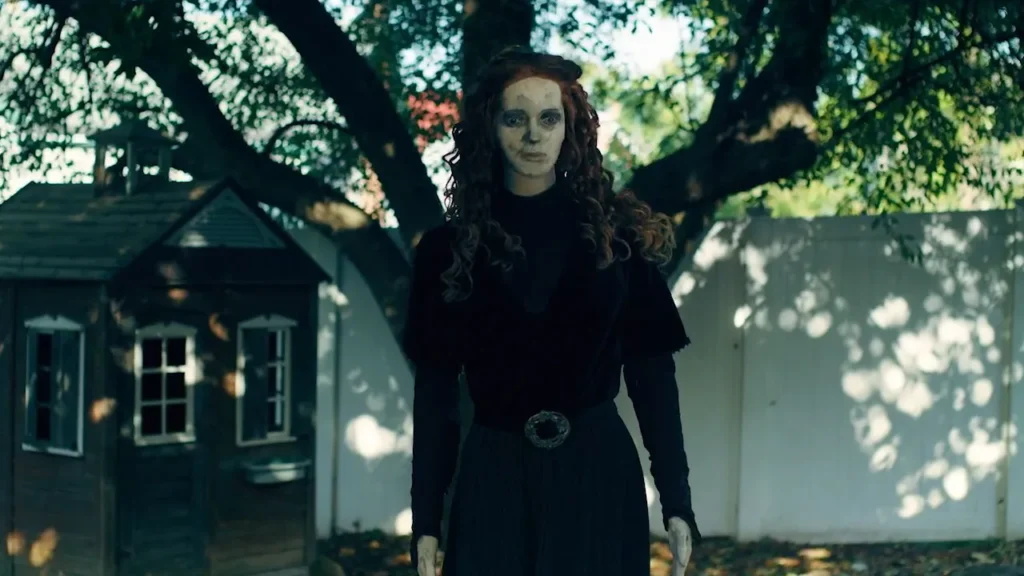In the realm of horror cinema, few names resonate as profoundly as Stephen Cognetti, the mastermind behind the acclaimed “Hell House LLC” series. With his latest endeavor, “825 Forest Road,” Cognetti steps away from his signature found-footage style, venturing into traditional narrative storytelling. This Shudder exclusive, released on April 4, 2025, offers a fresh perspective on supernatural horror, blending psychological tension with a haunting atmosphere. In this comprehensive review, we’ll delve into the film’s plot, performances, thematic depth, and its place within the horror genre.
Overview of 825 Forest Road
“825 Forest Road” introduces us to Chuck Wilson, portrayed by Joe Falcone, a man seeking solace after a devastating family tragedy. Alongside his wife Maria (Elizabeth Vermilyea) and sister Isabelle (Kathryn Miller), Chuck relocates to the seemingly serene town of Ashland Falls. However, the town harbors a dark secret: the lingering presence of Helen Foster, a woman who tragically ended her life in the 1940s. As Chuck delves deeper into the town’s mysteries, he uncovers a chilling connection between his family’s past and the enigmatic address—825 Forest Road—a place that doesn’t appear on any map. The narrative unfolds as Chuck races against time to confront the malevolent force threatening his loved ones.
Performances and Character Dynamics
Joe Falcone delivers a compelling performance as Chuck, capturing the character’s vulnerability and determination. Elizabeth Vermilyea’s portrayal of Maria adds emotional depth, while Kathryn Miller’s Isabelle provides a grounded perspective amidst the supernatural chaos. The supporting cast, including Joe Bandelli as Julian and Madeleine Garcia as Ashley, contribute to the film’s immersive atmosphere. Notably, Diomira Keane’s depiction of Helen Foster is both haunting and poignant, embodying the tragic essence of her character.
Directorial Approach and Cinematic Style
Stephen Cognetti’s transition from found-footage to traditional narrative is marked by a deliberate pacing and a focus on atmospheric tension. Collaborating with cinematographer David Gordon, Cognetti crafts a visually arresting film that emphasizes mood over jump scares. The use of lighting and shadow enhances the eerie ambiance, while Karl Preusser’s haunting score underscores the film’s psychological undertones. Editor Brian D. Lambert ensures a cohesive narrative flow, maintaining suspense throughout the 101-minute runtime.
At its core, “825 Forest Road” explores themes of grief, guilt, and the inescapable nature of the past. The film delves into the psychological ramifications of trauma, illustrating how unresolved emotions can manifest into tangible horrors. The cursed town of Ashland Falls serves as a metaphor for the characters’ internal struggles, emphasizing the idea that confronting one’s demons is essential for healing.
The film has elicited a spectrum of responses from critics. Hannah Gearan of Screen Rant rated it 3 out of 10, citing repetitive scenes that detract from the narrative. Tyler Doupe of Dread Central echoed similar sentiments, awarding the film a 2.0 and noting its lack of atmospheric tension. Brian Tallerico of RogerEbert.com offered a more critical view, giving it 1 out of 4 stars and suggesting that Cognetti’s strengths lie in the found-footage genre. Conversely, Culture Crypt provided a more favorable assessment, scoring the film 70 out of 100 and praising its psychological suspense and indie charm.
Final Thoughts
“825 Forest Road” represents a bold step for Stephen Cognetti, showcasing his versatility as a filmmaker. While the film may not resonate with all audiences, particularly those expecting traditional horror tropes, it offers a nuanced exploration of psychological terror. The deliberate pacing, atmospheric cinematography, and thematic depth contribute to a haunting cinematic experience. For viewers seeking a horror film that prioritizes emotional resonance over conventional scares, “825 Forest Road” is a noteworthy addition to the genre.
In the ever-evolving landscape of horror cinema, “825 Forest Road” stands as a testament to the genre’s capacity for introspection and innovation. Stephen Cognetti’s foray into traditional storytelling underscores the importance of narrative depth and character development in crafting compelling horror. While the film may polarize audiences, its commitment to exploring the human psyche amidst supernatural elements is commendable. As horror continues to push boundaries, “825 Forest Road” serves as a reminder that true terror often lies within.

